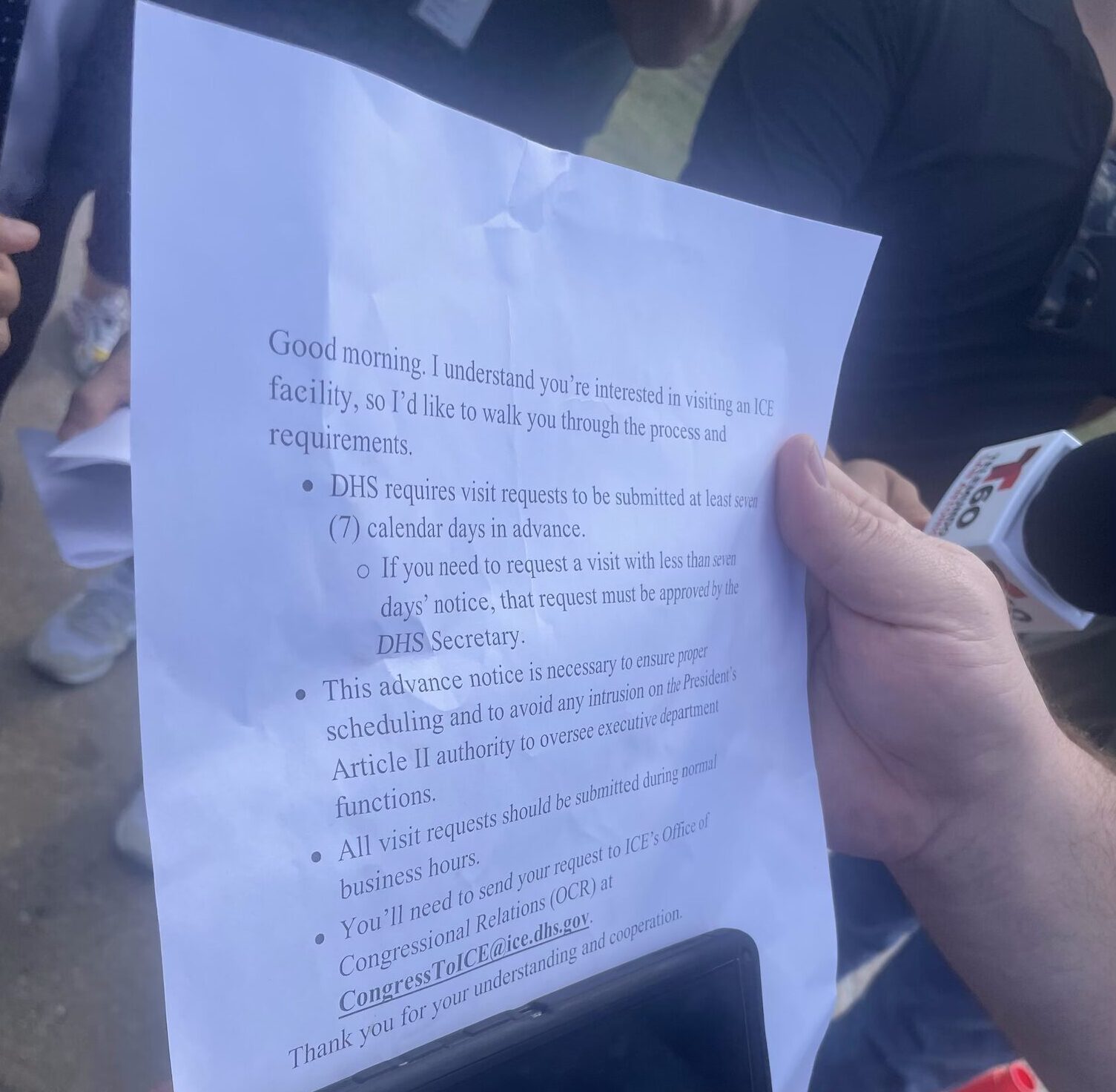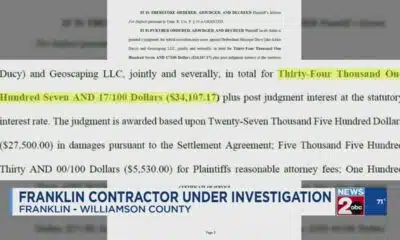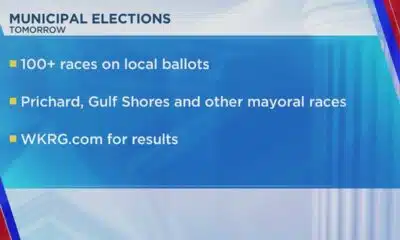News from the South - Texas News Feed
Texas braces for a busy hurricane season and NOAA cuts
“Staff vacancies hit Texas weather offices as they brace for a busy hurricane season” was first published by The Texas Tribune, a nonprofit, nonpartisan media organization that informs Texans — and engages with them — about public policy, politics, government and statewide issues.
Sign up for The Brief, The Texas Tribune’s daily newsletter that keeps readers up to speed on the most essential Texas news.
FORT WORTH — With hurricane season underway and an above-normal activity forecast, some National Weather Service offices like Houston — where as many as 44% of positions are vacant — are operating with staff shortages, prompting concerns about their capacity to monitor future storms.
The shortages stem from federal cuts that slashed roughly 10% of National Oceanic and Atmospheric Administration’s workforce and triggered a wave of early retirements. While no staff members from the Houston/Galveston office were laid off, several hundred employees at NOAA, which hosts the National Weather Service, took a voluntary early retirement package.
Among those stepping down: Jeff Evans, longtime meteorologist-in-charge in Houston, who retired after 34 years with the NWS, 10 of those in Texas. He told KPRC Click2Houston that it was “an honor and a privilege” to serve Texas through countless disasters.
The Houston office has 11 vacancies — 44% of its regular staffing.
The NWS provides weather warnings for tornadoes, hurricanes, wildfires and floods, and produces river and hydrological outlooks and long-term climate change data. It serves as the forecast of record for many, including TV meteorologists, journalists and researchers, as well as emergency managers, who use it to plan for potential evacuations and rescue coordination during extreme weather events.
Mark Fox, who usually works at the Oklahoma office, has stepped in to help as acting meteorologist-in-charge in Houston. Despite the strain, Fox and other local meteorologists say they’re committed to delivering life-saving forecasts and supporting emergency preparedness.
“We can continue 24/7 with the staff that we have,” Fox said. “If we need to augment staff to kind of help out and give some people a break, we can do that. But the mission is going to be fulfilled.”
Busy hurricane season
Hurricane season started June 1 and goes to November 30. NWS forecasters predict an above-normal hurricane season, citing warm Atlantic waters and weak wind shear, which are changes in the wind’s speed and direction.
The agency forecasts 13 to 19 named storms, three to five of which could become Category 3 or higher hurricanes with wind speeds of at least 111 miles per hour. For context, last year’s forecast included 17 to 25 named storms and the season saw 18 named storms, 11 of which were hurricanes. Among them were Tropical Storm Alberto and Hurricane Beryl — a Category 1 that left millions of Texans without electricity for days.
NOAA defines an average Atlantic hurricane season as one with 14 named storms, of which three are stronger hurricanes, based on data from 1991 to 2020.
NOAA has a 70% confidence level in these predictions and warns that the peak of the season — typically late August through October — could be intense. The West African Monsoon, a key hurricane trigger, is also expected to be stronger than usual.
However, Fox says, this isn’t just about numbers. It’s about readiness.
“It only takes one,” Fox said. “We’ll be watching the skies from here until the end of the season, and take whatever Mother Nature throws at us.”
Federal cuts’ impact on Texas
Since the start of the year, the National Weather Service has lost nearly 600 employees due to cuts ordered by the Department of Government Efficiency under the Trump administration. After backlash, earlier this month, 126 positions, including “mission-critical” ones, were approved for hire as exceptions to a federal hiring freeze. Erica Grow Cei, a National Weather Service spokesperson, said these were approved to “stabilize frontline operations” and added that the new hires will fill positions at field offices where there’s “the greatest operational need.”
The nearly 600 employees that NWS has lost in the last six months has been about the same amount the agency lost in the 15 years prior, according to Tom Fahy, the legislative director for the National Weather Service Employees Organization, a union that represents weather service employees.
Fahy called the quick exodus unprecedented, saying it “definitely disrupts the entire staffing requirements for the National Weather Service” in a way previous reductions did not.
Jeff Masters, former NOAA Hurricane Hunter and a meteorologist who writes about extreme weather for Yale Climate Connections, says most of those roles won’t be filled in time to help this hurricane season.
“This was done very inefficiently,” Masters said. “First, all of the probationary employees were fired, then incentives were given to get the most experienced managers out through early retirement. Now they’re trying to do some rehiring, and then it’s just not being done very efficiently.”
Masters said that the local offices have lost critical institutional knowledge and expertise.
Nationwide, reduced staffing has also meant fewer balloon launches, which are essential for collecting upper-atmosphere temperature, humidity and wind speed data critical to accurate storm modeling. A reduction in launches may lead to larger errors in hurricane tracking, says Masters.
Faced with these gaps, offices across the country are lending staff — either in person or virtually — to ensure continuous coverage during major weather events. Fahy said that this is what will keep Texas as whole “in very good shape and ready for hurricane season.”
“It’s kind of like binding hands and helping each other out wherever we can,” said Jason Johnson, hydrologist in charge at the NWS Fort Worth office. “We’ve expanded our training so meteorologists and hydrologists in other regions are ready to support us if needed.”
Despite the cuts, Johnson says Texas NWS offices remain focused on protecting lives and property.
“We’re not expecting any drop in the quality or quantity of information that we provide,” he said.
Local officials are also stepping up their preparation efforts.
“Now more than ever, local preparation is key,” said Harris County Commissioner Lesley Briones, who represents portions of Houston, Katy, Stafford, Tomball and Waller, at a press conference. “With drastic cuts… what we do here at home in Houston and Harris County is extra important.”
Her office is hosting 11 hurricane preparedness workshops and has distributed hundreds of portable air conditioners, emergency kits, and bottled water. They also plan to clear more than 7 million feet of ditches to prevent urban flooding.
“We can’t wait,” Briones said. “So local government, with our nonprofit community, with our private sector, with our places of worship, our schools, this is up to all of us.”
Meteorologists and emergency officials alike urge residents to stay informed, prepare emergency kits, and heed evacuation orders if issued.
“It’s your responsibility to monitor the weather,” Fox, the meteorologist at the Houston office, said. “On a beautiful day, just think about your plan — because when the time comes to act, it’s too late to start planning.”
Big news: 20 more speakers join the TribFest lineup! New additions include Margaret Spellings, former U.S. secretary of education and CEO of the Bipartisan Policy Center; Michael Curry, former presiding bishop and primate of The Episcopal Church; Beto O’Rourke, former U.S. Representative, D-El Paso; Joe Lonsdale, entrepreneur, founder and managing partner at 8VC; and Katie Phang, journalist and trial lawyer.
TribFest 2025 is presented by JPMorganChase.
This article originally appeared in The Texas Tribune at https://www.texastribune.org/2025/06/09/texas-noaa-hurricane-season-forecast-nws-trump-cuts/.
The Texas Tribune is a member-supported, nonpartisan newsroom informing and engaging Texans on state politics and policy. Learn more at texastribune.org.
The post Texas braces for a busy hurricane season and NOAA cuts appeared first on feeds.texastribune.org
Note: The following A.I. based commentary is not part of the original article, reproduced above, but is offered in the hopes that it will promote greater media literacy and critical thinking, by making any potential bias more visible to the reader –Staff Editor.
Political Bias Rating: Center-Left
This article focuses on the impacts of federal budget cuts to the National Oceanic and Atmospheric Administration (NOAA) and National Weather Service staffing, highlighting concerns regarding public safety and hurricane preparedness. It provides context linking these cuts to the Trump administration and includes critical viewpoints on their efficiency and consequences. The tone is fact-based and emphasizes the importance of government and local community roles in disaster readiness, aligning it slightly left of center due to its critical stance on recent conservative federal policies while maintaining an informative and balanced approach.
News from the South - Texas News Feed
'Bathroom bill' advances in Texas House days after tensions flared at hearing
SUMMARY: A Texas House panel approved Senate Bill 8, limiting transgender people’s use of bathrooms in government buildings, marking the first House advancement of a “bathroom bill” in over eight years. The bill, backed by Gov. Greg Abbott, passed 9-3 in committee and now heads to the House floor. SB 8 imposes penalties on institutions allowing restroom use not matching sex assigned at birth and extends restrictions to schools, universities, shelters, prisons, and jails. Opponents warn it promotes harassment and violence, while supporters cite protection of women and children. The bill includes measures to shield it from legal challenges. Lawmakers must pass bills by Sept. 13.
The post 'Bathroom bill' advances in Texas House days after tensions flared at hearing appeared first on www.kxan.com
News from the South - Texas News Feed
Texas House Republicans vote against retroactive punishments for quorum breakers
SUMMARY: A week after Texas House Democrats fled to block Republicans’ redistricting vote on the “Big, Beautiful Map,” Republicans are pushing bills to punish or prevent future quorum breaks. Proposed measures include banning fundraising during quorum breaks, vacating seats after seven unexcused absences, and lowering the quorum threshold from two-thirds to a simple majority. While Republicans support these bills, they failed to censure the Democrats. Democrats face fines exceeding $9,000 each for their absence, including costs for Texas DPS efforts to return them. Additionally, a Senate proposal aims to ban fundraising during special sessions to deter quorum breaks and save taxpayer money.
Read the full article
The post Texas House Republicans vote against retroactive punishments for quorum breakers appeared first on www.kxan.com
News from the South - Texas News Feed
Dems in Congress Are Being Denied Access to ICE Facilities. Now They’re Suing.
At least a dozen Democratic members of Congress have been denied entry to federal immigration facilities this year when they showed up to conduct oversight as President Donald Trump has ramped up his mass deportation efforts. Now, they are suing the Trump administration.
The lawsuit was filed in the federal district court for the District of Columbia on July 30 by 12 Democrats from the House of Representatives, including El Paso Congresswoman Veronica Escobar, who has provided oversight of such facilities for several years.
“As part of its campaign of mass deportation, the Trump-Vance administration has stretched the U.S. immigration detention system far beyond its capacity. More people are being held by the United States in immigration detention than ever before, with many facilities housing more individuals than they were built to contain,” the lawsuit states. “Reports of mistreatment have been widespread and have included disturbing details of overcrowding, food shortages, lack of adequate medical care, and unsanitary conditions.”
Since 2019, Congress has adopted statutory provisions stating that the Department of Homeland Security (DHS) may not use federal funds may to prevent members “from entering, for the purpose of conducting oversight, any facility operated by or for the Department of Homeland Security used to detain or otherwise house” noncitizens, per the lawsuit. Those mandates for unfettered oversight were a direct response to Trump’s attempts to block members of Congress under his first administration.
However, since June, several members of Congress have been turned away when attempting to enter and examine federal immigration facilities, including privately run detention centers and ICE field offices where immigrants have been detained.
Escobar currently serves on the House Appropriations Committee and its Subcommittee on Homeland Security, which oversees DHS. In her six years serving Congress, she and her staff members have conducted numerous visits to DHS facilities, and identified issues that saved taxpayers money or improved facility conditions for detainees. Prior to this year, she had only been turned away once, in 2019, from a facility when attempting to conduct oversight.
“It is not acceptable for the Trump administration to ignore the law and limit Congressional oversight and authority; this cannot go unchallenged,” Escobar said in a statement announcing the lawsuit.
U.S. Representative Greg Casar, an Austin Democrat, is among the latest members of Congress to be turned away when requesting to conduct oversight. On August 15, Casar attempted to access the Don T. Hutto Detention Center in Taylor, which is operated by DHS contractor CoreCivic, after receiving complaints that the air conditioning was not functioning properly and that detainees were “boiling.” The congressman, along with Austin-based attorney Andrea Jarero, who was trying to visit a client, were both denied access by CoreCivic.
When journalists, activists, Casar and his staff arrived at the detention facility, CoreCivic employees had blocked off access to the building’s parking lot with traffic cones and two white vans. A CoreCivic employee exited his vehicle and told Casar he’d need to schedule any visits at least seven days in advance. “This advance notice is necessary to ensure proper scheduling and to avoid any intrusion on the President’s Article II authority to oversee executive department functions,” the employee said, reading from a piece of paper.
The statutory provisions of recent DHS appropriations bills explicitly say that they may not “be construed to require a Member of Congress to provide prior notice of the intent to enter a [DHS] facility.” However, per the lawsuit, the Trump administration has unilaterally enacted a new policy that requires seven calendar days’ notice ahead of any visit to a DHS facility.
“What are they hiding, if they will break the law and not let a member of Congress in?” Casar said. “What are they hiding if they’ll violate constitutional rights and not let a lawyer in?”
Casar said that he intends to join his fellow Democratic members of Congress as a plaintiff in the lawsuit—though he has not done so yet.

Texas has the largest immigration detention capacity in the country, putting the state on the front lines of Trump’s mass deportation agenda. As of early August, more than 13,000 immigrants were detained in Texas facilities, according to data from the Transactional Records Access Clearinghouse (TRAC)—far more than any other state. That number will likely continue to grow: a new, $1.24-billion immigrant detention camp opened last week on Fort Bliss, a military base in El Paso, and is poised to be the nation’s largest once it reaches its full capacity to hold 5,000 people. (Escobar was allowed to access that facility on August 18 and said it held 1,000 detainees at that time, though she was not able to speak to any.)
Recent events bring new urgency to immigrant detention inspections: As of late June, 13 people had died in ICE detention this fiscal year—which is the same amount of deaths for the entirety of fiscal year 2024. (A report from several advocacy groups found that dozens of deaths between 2017 and 2021 in ICE detention facilities could have been prevented with adequate medical care.)
Additionally, more people are detained in ICE custody than ever before, and that number will likely continue to grow. The agency is also set to receive historic levels of funding; HR 1, Congress’ recent tax cuts-and-spending bill, contains $75 billion for ICE detention and removal operations.
As spending ramps up, oversight mechanisms have been stifled. Earlier this year, the Trump administration gutted some of the entities tasked with facility oversight, including the Office of the Immigration Detention Ombudsman. Escobar, the El Paso Democratic House member, said oversight is supposed to be multi-layered, but now “Trump has effectively done away with government watchdogs,” she told the Texas Observer.
Since the other agencies tasked with holding DHS accountable in detention centers have had major staff cuts, the role of members of Congress in conducting oversight of immigration detention is more important than ever, she said.
“There’s absolutely no reason for [DHS Secretary] Kristi Noem to block members of Congress from our legal ability to enter a facility unannounced,” Escobar said. “Unless she believes she has something to hide.”
The post Dems in Congress Are Being Denied Access to ICE Facilities. Now They’re Suing. appeared first on www.texasobserver.org
Note: The following A.I. based commentary is not part of the original article, reproduced above, but is offered in the hopes that it will promote greater media literacy and critical thinking, by making any potential bias more visible to the reader –Staff Editor.
Political Bias Rating: Center-Left
The content primarily focuses on criticism of the Trump administration’s immigration policies and their handling of oversight for immigration detention facilities. It highlights Democratic lawmakers’ efforts to conduct oversight and challenge restrictions imposed by the administration, emphasizing issues such as overcrowding, inadequate medical care, and detainee mistreatment. The piece also underscores government watchdog reductions under Trump and conveys skepticism toward officials enforcing access restrictions. While it presents factual information and quotes from Democratic representatives, the overall tone and framing favor a progressive viewpoint critical of conservative immigration enforcement, aligning it with a center-left bias.
-
News from the South - Alabama News Feed7 days ago
U.S. agriculture secretary announces end to subsidies for solar panels on farmland
-
News from the South - Kentucky News Feed6 days ago
First of its kind clinical trial offers new hope for Kentuckians at risk of dementia
-
News from the South - Georgia News Feed7 days ago
Don't eat this shrimp sold at Walmart due to possible radiation contamination: FDA
-
News from the South - Arkansas News Feed7 days ago
Cities across the US are embracing AI guidelines for local government workers
-
News from the South - Alabama News Feed6 days ago
Grants to boost local emergency alert systems in question as public media agency closes
-
News from the South - Arkansas News Feed6 days ago
‘Alligator Alcatraz’ probed by Dems as ICE detention centers multiply in states
-
Our Mississippi Home6 days ago
MSU Unveils Mixed-Use Development Featuring Boutique Hotel, Cultural Landmark
-
News from the South - Texas News Feed7 days ago
The Innocent and the Executed: James Beathard’s Long-Forgotten Story











































